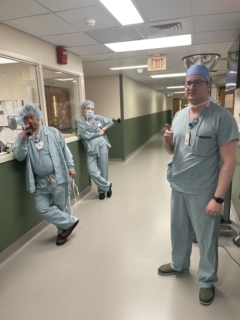
CRNAs from St. Anthony Medical Center on the day of the roof collapse incident. L-R: Amory Balucating, MS, CRNA; Mallory Cotter, CRNA; Francis Minor, DNP, CRNA.
When severe storms swept through northern Illinois on the night of March 31, 2023, and led to a concert venue’s roof collapsing, Certified Registered Nurse Anesthetists (CRNAs) rushed to a local hospital to help save lives.
Francis Minor, DNP, CRNA, a nurse anesthetist at St. Anthony Medical Center in Rockford, Illinois, recalled that he was sheltering in place at home when he received a text from the physician anesthesiologist on-call at the hospital saying there had been a mass casualty event. Not much more information was available at the time, but Minor knew he had to step into action.
“We have a good group here at St. Anthony, and I think part of what makes us a good group is we all look out for each other,” Minor said. “When an event like this happens, we don’t want just the physician anesthesiologist, and CRNA who are working that day at the hospital handling such a huge incident. We’re all here to help.”
He added, “We’re not in this profession to call it quits after our normal 40-hour workweek. We’re there and we’re ready to work if we need to.”
Minor was one of five CRNAs not on-call or scheduled to work that night who came to the hospital to help.
Slowly, details began to emerge throughout the night: a tornado had hit Belvidere, Illinois, leading to the roof of the Apollo Theater collapsing during a concert. Five people were seriously injured, 18 had moderate injuries, and five had minor injuries. One person was killed.
Amory Balucating, MS, CRNA, also a nurse anesthetist at St. Anthony, drove 40 minutes from his home to the hospital. As a veteran of the U.S. Air Force, Balucating said when he arrived at the hospital, his military training and his CRNA training both kicked in.
“It was like I tuned in and my entire focus was on what I needed to do in order to get things ready for a potential mass of people needing surgeries,” he said, describing how he made sure he had all the resources he would need to care for general trauma patients, such as blood products and fluids.
CRNAs are highly trained and skilled advanced practice registered nurses who provide anesthesia in all types of environments, from hospitals and ambulatory surgical centers to the U.S. military and beyond. They’re also trained in airway management, trauma stabilization, advanced patient assessment, and critical care — all useful and much-needed skills during a mass casualty event.
The hospital had one patient who required emergent surgery, a young man with a head injury. A neurosurgeon needed to relieve the compression on the patient’s brain. Minor and another CRNA helped get the patient to the operating room, and Balucating provided anesthesia.
Both Minor and Balucating praised the teamwork of their CRNA and physician colleagues, all of whom stepped up to provide the best possible care for patients in a rapidly changing situation.
“Everybody jumped in. No one was asking, ‘What can I do?’” Minor said. “They knew what was going on, and they knew how to help. We all worked as a team to help keep the patient alive and keep the patient safe.”